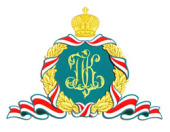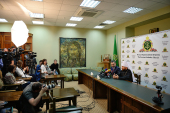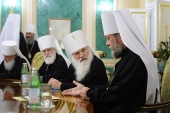Your Holiness, Beloved in the Lord fellow brother Patriarch Bartholomew,
Your Beatitudes and Your Holinesses!
Any meeting of the Chief Hierarchs is an important event. It is an opportunity to witness once more to our fraternal love, to exchange opinions, to discuss jointly issues concerning the Fullness of Orthodoxy, to give thanks and pray to God, to stand jointly before the Throne of the Lord, to partake of the one Cup of Christ, support each other prayerfully in hardships and trials. These meetings testify to the effectiveness of the ties within the One Orthodox Church, to the fact that we are ready to labour together for the preservation of the unity of the Church.
We are grateful to His Holiness our fellow brother the Patriarch of Constantinople Bartholomew for the initiative for these meeting which allows us to discuss the most important issues of the Pan-Orthodox agenda. One of these issues is undoubtedly the preparations for the Pan-Orthodox Council.
I have discussed the topic of the Pan-Orthodox Council many times with both the archpastors of our Church and our fellow brothers the Chief Hierarchs and representatives of the Local Churches. Today I would like once more to convey to all those present the vision of the Russian Orthodox Church and make known the opinion of our bishops which they expressed at the Episcopal Council in Moscow in February of 2013.
First of all, the Episcopal Council of the Russian Church expressed the common belief of our episcopate that at the Pan-Orthodox Council all decisions should be taken “on the basis of the unanimous will of all the Local Churches, and not by a majority of votes” (Resolutions of the Episcopal Council of the Russian Orthodox Church on 5th February 2013, n.60).
Moreover, our Council took the following stance: “The schedule and agenda of the Pan-Orthodox Church, the principles of its organization, the protocol of divine worship and seating arrangements and the drafts of the basic conciliar documents are to be agreed upon beforehand by all the Local Orthodox Churches. The hierarchs of the Russian Church believe that the preparations for the Pan-Orthodox Council should provide for a broad discussion of the resolutions and be distinguished by a special concern for the preservation of the purity of Orthodox teaching. The members of the Episcopal Council believe it necessary that the presidium of the Pan-Orthodox Council be comprised of the Chief Hierarchs of all the Local Orthodox Churches and that at the Council the episcopate of the Local Churches be represented as fully as possible” (Resolutions of the Episcopal Council of the Russian Orthodox Church on 5th February 2013, n.60).
I would like to pause in more detail on these decisions and explain their meaning.
The Pre-Conciliar process has been up to the present been guided by the principle of consensus. We have been making preparations for the Council since the Rhodes Convocation in 1961, when, at the the initiative of the Patriarchate of Constantinople, the principle of consensus was made the foundation of decision making: “The decisions of the common meetings are taken with the complete unanimity of the Churches' delegations” (The Order for the Functioning and Work of the Rhodes Pan-Orthodox Conference, n. 14), and then the use of the principle of consensus was confirmed by the schedule of the Pan-Orthodox Pre-Conciliar Convocations of 1986: “The texts on all the topics of the agenda of the Pan-Orthodox Pre-Conciliar Convocations are affirmed unanimously” (Article 16). It is on this basis that there was agreed the list of issues of the agenda of the Pan-Orthodox Council, the schedule for the work of the Pan-Orthodox Pre-Conciliar Convocations and the draft decisions on eight of the ten topics to be discussed at the Council. The principle of consensus has shown itself to be worthy, and it would be counterproductive and extremely dangerous to renounce it as we prepare for the Council.
Church history teaches us that without prior consensus councils are unsuccessful and do not bring unity to the Church. I can give as an example the Robbers' Council of Ephesus in 449 and the iconoclast council of 754. To bring to the Council issues that have not been agreed upon would turn the Council into a place of division, threaten Church unity and make difficult the reception of the Council's decisions in our Local Churches. Our task is to manifest the unity of the Church on issues concerning the Orthodox world. The voice of each Church, independent of how many members she has or how far back in antiquity she was founded, should be heard. The Pan-Orthodox Council should be the place where the Holy Spirit manifests his presence when the Church is of one mind, where the tyrannical submission of the minority to the will of the majority is impossible.
Sometimes one hears the opinion that the principle of consensus slows down the process of decision making and the preparations for the Council. But I believe that the reason for this slowing down does not lie here. Unfortunately, we do not have an effective mechanism for preparation. The secretariat, set up many years ago for the preparations for the Council, which provided for the participation of the representatives of the Local Orthodox Churches, does not function. The numerous proposals of the Russian Church to send its representative to the secretariat did not find a response.
I would like also, without going into a lengthy discussion on consensus, to say that references to the 6th canon of the First Ecumenical Council, as well as the 19th canon of the Council of Antioch, in this instance are incorrect. The canons just mentioned speak of a majority vote when electing and consecrating a bishop by the synods of the metropolia. The 19th canon of the Church of Antioch states: “May the opinion of the majority have preference.” This refers only to election. I quote further: “But if the consecration takes place according to the canons, and some, out of their love or argument, object, then may the decision of the majority take preference.” Nowhere do the canons state that the principle of the majority are to be applied to any other other issues than personal ones. And this tradition has been observed at all of our Synaxes, apart from one, when in 2005 we gathered to solve the issue of the Patriarch of Jerusalem. But the majority took a decision to recognize the resolution of the Synod of the Church of Jerusalem on the deposition of the Patriarch of Jerusalem. In no other cases, never in recent history, nor in the ancient history of the Church, when examining theological and canonical issues, was there used a means of voting based on adopting a majority decision.
The preparations for the Council must be done in an active manner. Creative energy has to be used for this end. We have to set up an effective organ comprising of representatives of the Local Churches, and this organ is to convene regularly, exchange opinions and materials, and also use the modern means of communications to make this task easier. If we really want to convoke a Pan-Orthodox Council, we have to learn how to work under such a regime.
We have, indeed, a great deal of work on both the topics of the Council and its schedule. Even the eight topics which have been delineated and agreed upon require further work on them by taking into account the changing realities, which you also mentioned in your speech, Your Holiness. The Council's decisions must be relevant and serve the unity of the Church, and not become a stumbling block for the people of God.
This especially concerns the two documents touching upon the topic of inter-Christian relations and dialogue with other confessions. In the context of the current development in a number of Protestant communities, which includes a radical departure from biblical moral norms, these texts have to be looked at again.
The document entitled 'The Contribution of the Orthodox Church to the Triumph of Peace, Justice, Brotherhood and Love between Peoples and the Elimination of Racial and Other Discrimination' contains important provisions on the dignity of the human person; however, it was compiled under the strong influence of its time. The problem of racism is not as relevant as it was in the 1980s.
It is essential that we prepare well and jointly all the topics of the Council's agenda and reach agreement upon them. If we cannot agree upon some issues immediately, then we should not be afraid of putting them off so that they can be examined by later Councils. If we can prepare this Council in a worthy manner, then I think it will not be the last such Council.
Moreover, there exist contemporary challenges that the Council cannot ignore. These are the mass expulsion of Christians from the Middle East and North Africa, which threaten the disappearance of the Christian presence in the lands where Christianity originally spread. These are the spiritual danger of the cult of consumerism, which lies at the heart of the current economic crisis, and which has hit hard the many countries of the Christian world; alas, the now pseudo-Christian world. These are also the attempts to introduce the so called gender philosophy, which destroys the foundations of morality and the family; these attempts have touched upon western countries and and now making their way towards the Orthodox East. These are the problems of bioethics such as cloning, surrogate motherhood and all that intrudes upon God-created human nature. To all these relevant issues the Orthodox Church ought to give a clear and agreed response rooted in her Tradition. At the same time, we have to come up with not only a theological, but also a pastoral response. Today our Church encounters issues such as the baptism of children born through “surrogate motherhood.” We cannot expect a common Orthodox decision on this issue, because the discussion in Russia on it is quite lively. There has been set up a special commission which has prepared pastoral recommendations in relation to the possibility of baptizing children born from “surrogate motherhood.”
Concerning the Council's schedule, then not once has it been put forward for joint discussion. The issue of the Council's schedule is far from a formal one. The Council must be a clear expression of our Orthodox ecclesiology as much as the Divine Liturgy and its conciliar celebration is an expression of our ecclesiology.
This concerns in the first instance the make up of the Council. The responsibility for the Church, which rests upon all bishops, demands the participation in the Council of all, or at least, all ruling bishops representing their flock. This not only consolidates the entire Orthodox episcopacy in an awareness of their responsibility for the fate of Orthodoxy, but will also be a manifestation of the strength and unity of Orthodoxy before the outside world. The Great and Holy Council cannot be less in terms numbers of participating members than the regular Episcopal Councils of the Local Churches. Today it is not at all difficult to bring together seven hundred people in one place. Indeed, even at the time of the Ecumenical Councils, when there were no means of transport and communications that we have today, there gathered a huge number of bishops. For example, at the Fourth Ecumenical Council more than six hundred participants were present.
We have to remember, too, that any artificial limiting of representation at the Council is can become a cause for displeasure and disagreements among the Orthodox episcopate. If the Pan-Orthodox Council adheres strictly to the principle of consensus, then in this instance the significance of the issue of representation is lowered somewhat. But our Church also considers the maximal participation of the bishops at the Pan-Orthodox Council to be extremely desirable. Even the outer image of the Council ought to be convincing for the non-Orthodox world. If a small group of people gather, and we call this a Great and Holy Council, then the whole world will look upon this with irony.
Secondly, our Church emphasizes that the presidium of the Pan-Orthodox Council be comprised of the Chief Hierarchs of all the Local Orthodox Churches with the first among equals at the head – His Holiness the Patriarch of Constantinople. We are taught this by history: at not a single Ecumenical Council was there the same presidency of the Chief Hierarch who is first according to the diptychs. The Presidium of the Chief Hierarchs of all the Churches, independent of of how many members there are in their Churches or how ancient they are, should visibly demonstrate our ecclesiology, according to which any Orthodox Church in communion with the other Churches, has rights equal to them. It is evident that the later Catholic model of a Council with only the Pope at the head is totally unacceptable for the Orthodox.
Of course, the entire Presidium cannot simultaneously guide the work of the Council. That is why we have the first among equals, who, with the consent of all the Orthodox Churches, bears the responsibility of co-ordinator.
We cannot but regret that not all the Chief Hierarchs of the Local Churches are taking part in today's gathering, which makes it incomplete. We have already had occasion to mention the absence of the Primate of the Orthodox Church in America, but it is explained by the fact that not all the Local Churches recognize her autocephaly. However, today there is absent the Chief Hierarch of a Church, the autocephaly of which everyone recognizes, His Beatitude Rostislav, Archbishop of Prešov and Metropolitan of the Czech Lands and Slovakia. He was legitimately elected by the Local Council of his Church in full accordance with her statutes. We ask ourselves, can we call our gathering a Synaxis of all the Chief Hierarchs of the Local Churches in this instance, and how can we then explain the absence of one of them?
We have to strive for the participation of all the Local Churches in the preparations for the Pan-Orthodox Council, and then our Council will became an expression of the prophetic voice of the Church, addressed both to her own people and to the outside world. Our own people are to feel the unity of the Church. The outer world is to see in the Council the vital power and dynamism of the Orthodox Church which God has bestowed upon her. We have to create all conditions lest we hinder the Holy Spirit acting in us and through us.
In the spirit of the above, I propose that we set up a renewed secretariat comprised of the representatives of the Local Orthodox Churches, which will work further on the draft documents, and will also straighten out all procedural issues. The secretariat will submit the result of its work to be reviewed by the Inter-Orthodox Preparatory Commission. If consensus is found in this commission, the documents will then be sent to the Pan-Orthodox Pre-Conciliar Convocation, which, after their confirmation, will then propose a date for the Council to begin.
Properly speaking, I am not making any new proposals, I am reiterating the procedure which was accepted by all the Orthodox Churches and which should be made more intensive, more dynamic, if we do not want the Council to be delayed.




